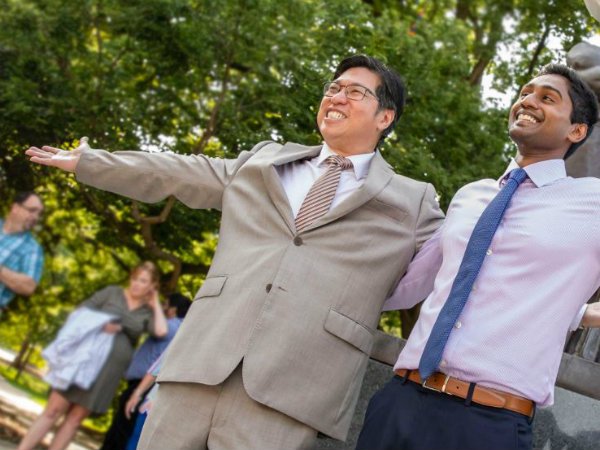Everything in Zachary Meade’s life has been preparing him for the journey to becoming a physician-innovator — even if he didn’t realize it until a year ago.
“Being here is surreal. It’s something I’ve worked so hard for, and now being a part of something that’s potentially the most revolutionary thing in a long time is inspiring,” said Meade.
 Meade is one of 32 future physician-innovators at the new Carle Illinois College of Medicine today. Settling into a routine of rigorous medical education at the world’s first engineering-based college of medicine, it’s clear no one takes the endeavor lightly.
Meade is one of 32 future physician-innovators at the new Carle Illinois College of Medicine today. Settling into a routine of rigorous medical education at the world’s first engineering-based college of medicine, it’s clear no one takes the endeavor lightly.
As their first semester winds down, the admissions team is gearing up with 2,300 applications for the highly anticipated second class of physician innovators. The unique admission requirement of holding a degree in engineering or mathematics sets apart this leading-edge partnership.
“I have great faith in the next generation of physicians. They bring game-changing skills, an outstanding commitment to patients, and are hungry for meaningful work. Our future is in great hands,” James C. Leonard, MD, President and CEO, Carle Foundation, said.
Mead said Carle Illinois doesn’t just teach him how a medication works and ask him to memorize it.
“I’m learning medication had a unique manufacturing process and as a physician, I should be aware. Because if we want to develop new techniques, we need to think ‘this had to be produced in some way’ and ‘this has to treat the patient in some way.’ In addition to clinic-focused education, we get to learn everything around it – business, engineering, entrepreneurship,” he said.
Andrea Jake, director, Student Affairs, Carle Illinois, said a key success feature of the new school is the learning community or innovation pods.
 Carle Illinois faculty member Jennie Hsu-Lumetta, MD, serves as a mentor of a “pod” of eight students alongside University of Illinois College of Medicine medical student advisors, Carle resident advisors and four faculty mentors consisting of a scientist, 2 clinicians and an engineer
Carle Illinois faculty member Jennie Hsu-Lumetta, MD, serves as a mentor of a “pod” of eight students alongside University of Illinois College of Medicine medical student advisors, Carle resident advisors and four faculty mentors consisting of a scientist, 2 clinicians and an engineer
The mentors offer students resources, advice and breaks like bowling or grabbing pizza. The students recently participated in a community screening to detect atrial fibrillation, a risk factor for stroke.
The pods focus on supporting the entire student as a person with a profound effect on overall health and wellness.
“It’s important for those learning to take care of others by taking care of themselves first,” Dr. Hsu-Lumetta said. “It’s a really wonderful way to approach supporting students. Academics and career development are important, but mentors also support their wellness – taking care of themselves and having experiences too.”

“People always said it’s a lot of work,” Gaddipati said. “What’s kind of surprising is that I am doing a lot of work, but it doesn’t feel like work, because I’m learning about things I’m interested in.”
Dr. Hsu-Lumetta said excitement spills over into Carle.
“We’re training the next generation,” she said. “Students are shadowing from nearly day one. They are seeing Carle’s successes with patient-centered care and team approaches.”
Carle Illinois medical student Valerie Chen’s interest in engineering emerged at a young age when she realized its potential to equip her with tools to solve problems and directly affect patients. “You’re not just solving a science problem. It’s a lot more nuanced and complicated than that. And I think that’s what makes it so exciting,” said Chen.
Categories: Culture of Quality, Redefining Healthcare
Tags: innovation, careers, physicians, Chen, Carle Illinois College of Medicine, Meade, Hsu-Lumetta
